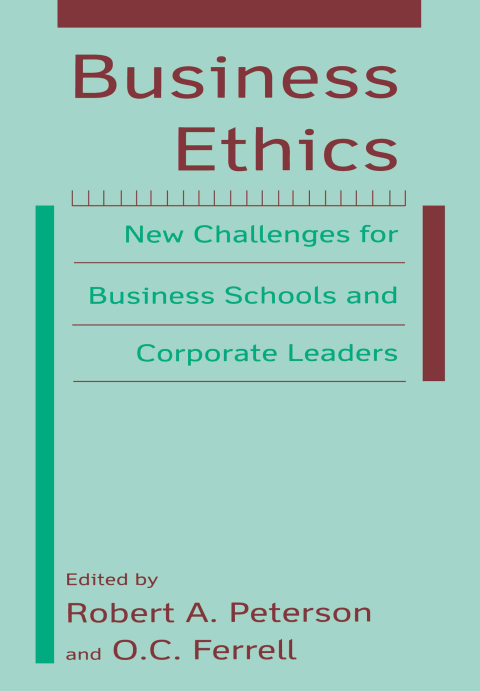Description
Efnisyfirlit
- Cover Page
- Half Title page
- Title Page
- Copyright Page
- Dedication
- Contents
- Figures, Tables, and Appendix
- Preface
- 1 A Framework for Understanding Organizational Ethics
- Defining Organizational Ethics
- Individual versus Organization
- Importance of Understanding Organizational Ethics
- Understanding Ethical Decision Making
- Ethical Issue Intensity
- Individual Factors
- Organizational Factors
- Ethical Issues
- Conflict of Interest
- Fraud
- Discrimination
- Need to Discover Ethical Issues
- Notes
- 2 Personal Moral Codes and the Hunt-Vitell Theory of Ethics: Why Do People’s Ethical Judgments Differ?
- Overview of the Hunt-Vitell Model
- Empirical Tests of the Theory
- Understanding Ethical Judgments
- Understanding Utility Maximization
- Conclusion
- Note
- 3 Why Do Good People Do Bad Things?: Challenges to Business Ethics and Corporate Leadership
- Some Good and Bad Reasons
- Human Nature and Self-Interest
- Disregard of Others
- Role Definitions of Job Responsibilities
- Training in Moral Reasoning
- Some Other Reasons
- Moral Imagination, Systems Thinking, and Moral Change: ExxonMobil in Chad and Cameroon
- The Chad and Cameroon Project
- Evaluating the Project
- Project Uncertainty
- Conclusion
- 4 Corporate Governance and Ethical Leadership
- The Nature of Corporate Governance
- Corporate Governance Models
- Brief History of Corporate Governance
- Issues in Corporate Governance Systems
- Boards of Directors
- Shareholders and Investors
- Internal Control and Risk Management
- CEO Compensation
- Linking Corporate Governance and Ethical Leadership
- Role of Ethical Leadership
- Role of Boards of Directors
- Future of Corporate Governance and Ethical Leadership
- 5 Ethical Leadership and Creating Value for Stakeholders
- Four Trends
- The Basic Framework of Managing for Stakeholders
- Ethics, Values, and the Creation of Value for Stakeholders
- The Basic Value Proposition
- The Principles of Stakeholder Cooperation
- Societal Standards of Conduct
- Ethics, Values, and the Concept of Leadership
- Amoral Leadership and Amoral Leadership Theories
- Values-Based Leadership Theories
- The Ethical Leader and Theories of Ethical Leadership
- The Tasks of the Ethical Leader in Creating Value for Stakeholders
- Implications for Business Schools
- Notes
- 6 Mindfulness and Integrity: The Ongoing Challenge of Leadership Development
- Ethics in Business Education
- Good News and Bad News
- Management Practice
- An Integral Approach to Business Education
- The Integrity Challenge
- Individual Leadership
- Organizational Leadership
- Business Leadership in Society
- The Mindfulness Challenge
- A Higher Purpose: Mindfulness and Integrity
- Note
- 7 Benchmarking Student Attitudes Regarding Ethical Issues
- Previous Related Research
- Research Methodology
- Sample and Data Collection
- Questionnaire
- Results
- Differences Across Subgroups
- Differences Across Items
- Observations
- 8 Auditor Independence and the Scope of CPA Services: Roots and Recent Developments
- The U.S. Constitution as a Social Contract That Influences Auditing
- Property (Wealth) vis-à-vis People (Franchise)
- Roots of Early Auditing Practice in U.S. Corporations Before the New Deal
- Disclosure and Public Markets
- The New Deal: Mandated “Independent” Audits
- Post-World War II Developments
- Auditor Independence: Meanings and Diverging Views
- Firm Processes
- The Politics of Scope of Services: The 1970s and After
- The New Century: Legislation to Restore Investor Confidence
- Multidisciplinary Firms: A Bridge Too Far or the Next Horizon?
- 9 System Design: The New Frontier for Ethical Leadership
- Serving the Financial Elite
- The Role of Shareholders
- The Stock Market Plays an Essential Function
- The Enron Scandal Provides an Example of Design System Problems
- An Opening for Change
- An Agenda for System Redesign
- Note
- 10 Ethical Leadership for Improved Corporate Governance and Better Business Education
- Propositions About Business Ethics Scandals
- Factors Contributing to the Ethics Meltdown
- Ethical Decision Making and Business Schools
- Changes Necessary for Better Business Ethics and Corporate Governance
- 11 Why Ethics and Profits Can and Must Work Together in Business
- The Purpose of Ethics
- Justification for a Purpose of Ethics
- The Role of Business in Achieving the Purpose of Ethics
- An Ethical Society’s Expectations for Business
- Value and Mission of an Ethical Society
- Expectations of an Ethical Society for Business
- Stakeholder Considerations
- A Profitable and Ethical Approach to Business
- Defining Trust
- Characteristics of a Trusting Relationship
- Requirements for Building Trust
- Factors That Destroy Trust
- Conditions Necessary for Operating a Trust-Link Approach in Business
- Leadership
- Core Values and Integrated Goals
- Fair Process
- Beyond Employees to Other Stakeholders
- Trust-Building and Ethics
- Behavior of an Ethical Company
- Trust-Building and Ethical Relations with Society and Organizations
- Trust-Building and Ethical Relationships with Individual Stakeholders
- Trust-Building and Profits
- Profit Implications of Building Trust Links with Individual Stakeholders
- Conclusion
- 12 Denial and Leadership in Business Ethics Education
- Denying Ethics in Curricula
- Perpetuating Denial in Business Schools
- Admitting the Public Danger of Business School Graduates
- Recognizing Schools with Ethics Coverage
- Reforming Ethics Education
- Corporate Officers Should Demand Changes
- University Administrators Should Apply Pressure
- AACSB Should Provide “Postmortem Oversight”
- Public Policy Initiatives Could Make a Difference
- The Media Should Intensify Coverage
- Toward Leading Ethics Education
- Notes
- 13 Reflections
- Ethics in Business
- Business Ethics
- Business Ethics Education
- Ethics Leadership
- References
- About the Editors and Contributors
- Index






Reviews
There are no reviews yet.